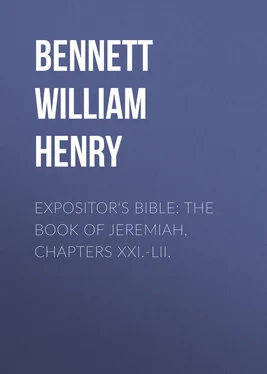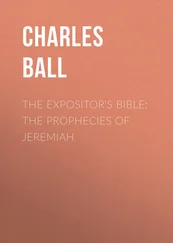William Bennett - Expositor's Bible - The Book of Jeremiah, Chapters XXI.-LII.
Здесь есть возможность читать онлайн «William Bennett - Expositor's Bible - The Book of Jeremiah, Chapters XXI.-LII.» — ознакомительный отрывок электронной книги совершенно бесплатно, а после прочтения отрывка купить полную версию. В некоторых случаях можно слушать аудио, скачать через торрент в формате fb2 и присутствует краткое содержание. Издательство: Иностранный паблик, Жанр: foreign_religion, foreign_antique, foreign_prose, на английском языке. Описание произведения, (предисловие) а так же отзывы посетителей доступны на портале библиотеки ЛибКат.
- Название:Expositor's Bible: The Book of Jeremiah, Chapters XXI.-LII.
- Автор:
- Издательство:Иностранный паблик
- Жанр:
- Год:неизвестен
- ISBN:нет данных
- Рейтинг книги:5 / 5. Голосов: 1
-
Избранное:Добавить в избранное
- Отзывы:
-
Ваша оценка:
- 100
- 1
- 2
- 3
- 4
- 5
Expositor's Bible: The Book of Jeremiah, Chapters XXI.-LII.: краткое содержание, описание и аннотация
Предлагаем к чтению аннотацию, описание, краткое содержание или предисловие (зависит от того, что написал сам автор книги «Expositor's Bible: The Book of Jeremiah, Chapters XXI.-LII.»). Если вы не нашли необходимую информацию о книге — напишите в комментариях, мы постараемся отыскать её.
Expositor's Bible: The Book of Jeremiah, Chapters XXI.-LII. — читать онлайн ознакомительный отрывок
Ниже представлен текст книги, разбитый по страницам. Система сохранения места последней прочитанной страницы, позволяет с удобством читать онлайн бесплатно книгу «Expositor's Bible: The Book of Jeremiah, Chapters XXI.-LII.», без необходимости каждый раз заново искать на чём Вы остановились. Поставьте закладку, и сможете в любой момент перейти на страницу, на которой закончили чтение.
Интервал:
Закладка:
Before these judges, Jeremiah's ecclesiastical accusers brought a formal charge; they said, almost in the very words which the high priest and the Sanhedrin used of Christ, "This man is worthy of death, for he hath prophesied against this city, as ye have heard with your ears" — i. e. when he said, "This house shall be like Shiloh, and this city shall be desolate without inhabitant." Such accusations have been always on the lips of those who have denounced Christ and His disciples as heretics. One charge against Himself was that He said, "I will destroy this Temple that is made with hands, and in three days I will build another that is made without hands." 17 17 Mark xiv. 58.
Stephen was accused of speaking incessantly against the Temple and the Law, and teaching that Jesus of Nazareth would destroy the Temple and change the customs handed down from Moses. When he asserted that "the Most High dwelleth not in temples made with hands," the impatience of his audience compelled him to bring his defence to an abrupt conclusion. 18 18 Acts vi. 13, 14, vii. 48.
Of Paul we have already spoken.
How was it that these priests and prophets thought that their princes might be induced to condemn Jeremiah to death for predicting the destruction of the Temple? A prophet would not run much risk nowadays by announcing that St. Paul's should be made like Stonehenge, or St. Peter's like the Parthenon. Expositors of Daniel and the Apocalypse habitually fix the end of the world a few years in advance of the date at which they write, and yet they do not incur any appreciable unpopularity. It is true that Jeremiah's accusers were a little afraid that his predictions might be fulfilled, and the most bitter persecutors are those who have a lurking dread that their victims are right, while they themselves are wrong. But such fears could not very well be evidence or argument against Jeremiah before any court of law.
In order to realise the situation we must consider the place which the Temple held in the hopes and affections of the Jews. They had always been proud of their royal sanctuary at Jerusalem, but within the last hundred and fifty years it had acquired a unique importance for the religion of Israel. First Hezekiah, and then Josiah, had taken away the other high places and altars at which Jehovah was worshipped, and had said to Judah and Jerusalem, "Ye shall worship before this altar." 19 19 2 Kings xviii. 4, xxiii.; Isa. xxxvi. 7.
Doubtless the kings were following the advice of Isaiah and Jeremiah. These prophets were anxious to abolish the abuses of the local sanctuaries, which were a continual incentive to an extravagant and corrupt ritual. Yet they did not intend to assign any supreme importance to a priestly caste or a consecrated building. Certainly for them the hope of Israel and the assurance of its salvation did not consist in cedar and hewn stones, in silver and gold. And yet the unique position given to the Temple inevitably became the starting-point for fresh superstition. Once Jehovah could be worshipped not only at Jerusalem, but at Beersheba and Bethel and many other places where He had chosen to set His name. Even then, it was felt that the Divine Presence must afford some protection for His dwelling-places. But now that Jehovah dwelt nowhere else but at Jerusalem, and only accepted the worship of His people at this single shrine, how could any one doubt that He would protect His Temple and His Holy City against all enemies, even the most formidable? Had He not done so already?
When Hezekiah abolished the high places, did not Jehovah set the seal of approval upon his policy by destroying the army of Sennacherib? Was not this great deliverance wrought to guard the Temple against desecration and destruction, and would not Jehovah work out a like salvation in any future time of danger? The destruction of Sennacherib was essential to the religious future of Israel and of mankind; but it had a very mingled influence upon the generations immediately following. They were like a man who has won a great prize in a lottery, or who has, quite unexpectedly, come into an immense inheritance. They ignored the unwelcome thought that the Divine protection depended on spiritual and moral conditions, and they clung to the superstitious faith that at any moment, even in the last extremity of danger and at the eleventh hour, Jehovah might, nay, even must , intervene. The priests and the inhabitants of Jerusalem could look on with comparative composure while the country was ravaged, and the outlying towns were taken and pillaged; Jerusalem itself might seem on the verge of falling into the hands of the enemy, but they still trusted in their Palladium. Jerusalem could not perish, because it contained the one sanctuary of Jehovah; they sought to silence their own fears and to drown the warning voice of the prophet by vociferating their watchword: "The Temple of Jehovah! the Temple of Jehovah! The Temple of Jehovah is in our midst!" 20 20 vii. 4.
In prosperous times a nation may forget its Palladium, and may tolerate doubts as to its efficacy; but the strength of the Jews was broken, their resources were exhausted, and they were clinging in an agony of conflicting hopes and fears to their faith in the inviolability of the Temple. To destroy their confidence was like snatching away a plank from a drowning man. When Jeremiah made the attempt, they struck back with the fierce energy of despair. It does not seem that at this time the city was in any immediate danger; the incident rather falls in the period of quiet submission to Pharaoh Necho that preceded the battle of Carchemish. But the disaster of Megiddo was fresh in men's memories, and in the unsettled state of Eastern Asia no one knew how soon some other invader might advance against the city. On the other hand, in the quiet interval, hopes began to revive, and men were incensed when the prophet made haste to nip these hopes in the bud, all the more so because their excited anticipations of future glory had so little solid basis. Jeremiah's appeal to the ill-omened precedent of Shiloh naturally roused the sanguine and despondent alike into frenzy.
Jeremiah's defence was simple and direct: "Jehovah sent me to prophesy all that ye have heard against this house and against this city. Now therefore amend your ways and your doings, and hearken unto the voice of Jehovah your God, that He may repent Him of the evil that He hath spoken against you. As for me, behold, I am in your hands: do unto me as it seems good and right unto you. Only know assuredly that, if ye put me to death, ye will bring the guilt of innocent blood upon yourselves, and upon this city and its inhabitants: for of a truth Jehovah sent me unto you to speak all these words in your ears." There is one curious feature in this defence. Jeremiah contemplates the possibility of two distinct acts of wickedness on the part of his persecutors: they may turn a deaf ear to his appeal that they should repent and reform, and their obstinacy will incur all the chastisements which Jeremiah had threatened; they may also put him to death and incur additional guilt. Scoffers might reply that his previous threats were so awful and comprehensive that they left no room for any addition to the punishment of the impenitent. Sinners sometimes find a grim comfort in the depth of their wickedness; their case is so bad that it cannot be made worse, they may now indulge their evil propensities with a kind of impunity. But Jeremiah's prophetic insight made him anxious to save his countrymen from further sin, even in their impenitence; the Divine discrimination is not taxed beyond its capabilities even by the extremity of human wickedness.
But to return to the main feature in Jeremiah's defence. His accusers' contention was that his teaching was so utterly blasphemous, so entirely opposed to every tradition and principle of true religion – or, as we should say, so much at variance with all orthodoxy – that it could not be a word of Jehovah. Jeremiah does not attempt to discuss the relation of his teaching to the possible limits of Jewish orthodoxy. He bases his defence on the bare assertion of his prophetic mission – Jehovah had sent him. He assumes that there is no room for evidence or discussion; it is a question of the relative authority of Jeremiah and his accusers, whether he or they had the better right to speak for God. The immediate result seemed to justify him in this attitude. He was no obscure novice, seeking for the first time to establish his right to speak in the Divine name. The princes and people had been accustomed for twenty years to listen to him, as to the most fully acknowledged mouthpiece of Heaven; they could not shake off their accustomed feeling of deference, and once more succumbed to the spell of his fervid and commanding personality. "Then said the princes and all the people unto the priests and the prophets, This man is not worthy of death; for he hath spoken to us in the name of Jehovah our God." For the moment the people were won over and the princes convinced; but priests and prophets were not so easily influenced by inspired utterances; some of these probably thought that they had an inspiration of their own, and their professional experience made them callous.
Читать дальшеИнтервал:
Закладка:
Похожие книги на «Expositor's Bible: The Book of Jeremiah, Chapters XXI.-LII.»
Представляем Вашему вниманию похожие книги на «Expositor's Bible: The Book of Jeremiah, Chapters XXI.-LII.» списком для выбора. Мы отобрали схожую по названию и смыслу литературу в надежде предоставить читателям больше вариантов отыскать новые, интересные, ещё непрочитанные произведения.
Обсуждение, отзывы о книге «Expositor's Bible: The Book of Jeremiah, Chapters XXI.-LII.» и просто собственные мнения читателей. Оставьте ваши комментарии, напишите, что Вы думаете о произведении, его смысле или главных героях. Укажите что конкретно понравилось, а что нет, и почему Вы так считаете.












